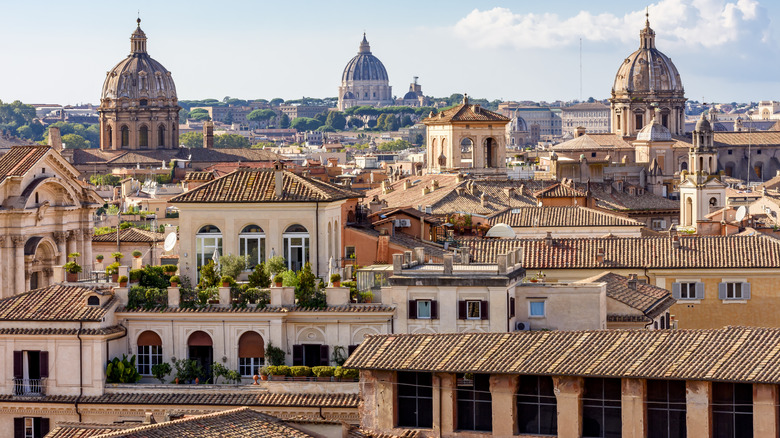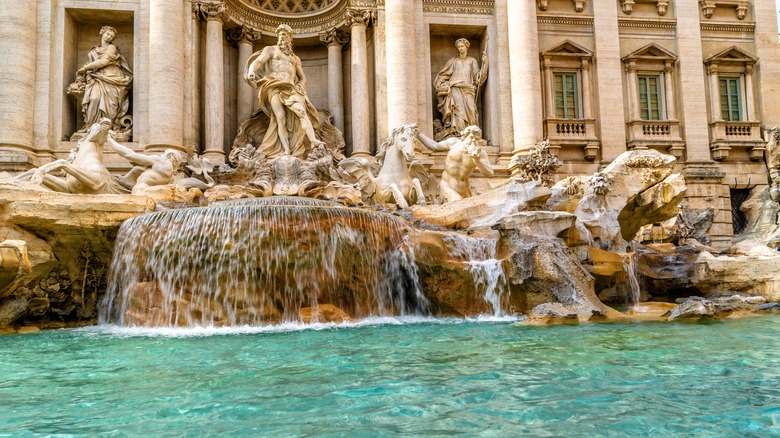Pub Crawls Are Banned In This Popular European City
Nicknamed the Eternal City, Rome, Italy is one of Europe's premier tourist destinations. In fact, Rome receives over 10 million visitors annually, making it one of the most visited cities on the continent. The city has something for everybody, especially history and architecture lovers. Popular destinations include the Colosseum, the Vatican, the Trevi Fountain, and many more beloved sites. Likewise, Rome is filled with underrated attractions you'll want to add to your bucket list. And if you want to see highlights of Rome's City Center, you can always take a bike tour. However, one thing you can't legally do in Rome is participate in a pub crawl.
Pub crawls, which take tourists on a tour of several bars in one night, are popular in major European cities as they provide visitors with a glimpse of nightlight at their destination. According to the Independent, Rome enacted this law in 2018 as part of The Code of Civil Existence, a civic code that subsequently prohibited any organized pub crawls.
It also banned public drinking or buying alcohol from 10 p.m. to 7 a.m. While it might seem excessive to exclude such an in-demand activity and limit the consumption of alcohol in the city, there's a dark reason behind this decision.
Rome's binge drinking problem
The 2018 law that banned pub crawls in Rome was not the first alcohol-related legislation enacted in the city. In early 2009, the city passed a law that curbed the sale of alcohol after 9 p.m. That same year, Rome banned public drinking during the summer to prevent teenagers from binge drinking. The MinnPost reported in 2010 that local pub owners in Rome were starting to get fed up with the excessive drinking habits of tourists, noting specifically that pub crawls were wreaking havoc in the city.
With their affordable price of 20 Euros, pub crawls drew in large crowds in Rome. However, One unnamed pub manager told the publication he decided against having pub crawls visit his establishment, explaining, "Herds of young tourists barge in, drink as much as possible in 10 minutes, and then move on to the next pub. Shouting, singing, and puking on the pavement. Allowing such things, just for the sake of earning money, goes against my morals."
In 2014, tragedy struck the city when John Durkin, a New Hampshire college student studying in Italy, died after being hit by a train. The last place Durkin had been before this accident was Sloppy Sam's, a prominent pub crawl stop in Rome. In 2017, Rome's mayor, Virginia Raggi, outlawed public drinking or buying alcohol from 10 p.m. to 7 a.m. from July to the end of October. This law was a predecessor to The Code of Civil Coexistence.
Here's what else you can't do in Rome
The Independent states that The Code of Civil Coexistence banned establishments in Rome from providing patrons with alcohol after 2 a.m. Likewise, this civic code implemented new rules for Trevi Fountain and other well-known fountains in Rome. Visitors were warned against climbing, bathing, or placing anything in the fountains. Coins, however, were still allowed at Trevi. Moreover, individuals dressed as Ancient Roman military officers, known as Centurions, were also banned from making money off tourists from photos, etc. The Centurions could be slapped with a $450 fee if the authorities caught wind of this.
CNN reported that breaking any of these rules could also result in individuals being banned from a location in Rome for hours or weeks. In 2019, Rome decided to continue enforcing these laws through their New Urban Regulations. As of 2022, these laws continue to be in effect, per NBC 5. In September of that year, an American tourist was charged $450 for eating at the Fontana dei Catecumeni, a fountain from the 16th century.
To further combat the excess consumption of alcohol in Italy, the country changed its drinking age. In 2010, the MinnPost wrote that the legal drinking age in Italy was 16. While it's unclear when this change occurred, at the time of this publication, you must be 18 years and older to drink alcohol in Italy legally.


